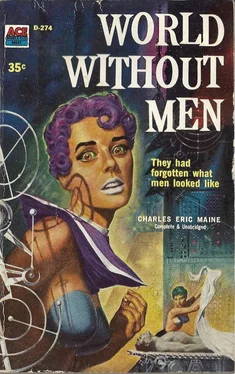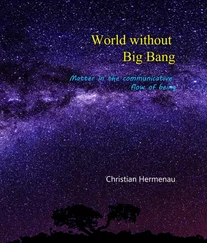Charles Maine - World Without Men
Здесь есть возможность читать онлайн «Charles Maine - World Without Men» весь текст электронной книги совершенно бесплатно (целиком полную версию без сокращений). В некоторых случаях можно слушать аудио, скачать через торрент в формате fb2 и присутствует краткое содержание. Город: New York, Год выпуска: 2013, Издательство: Ace Books, Жанр: Фантастика и фэнтези, на английском языке. Описание произведения, (предисловие) а так же отзывы посетителей доступны на портале библиотеки ЛибКат.
- Название:World Without Men
- Автор:
- Издательство:Ace Books
- Жанр:
- Год:2013
- Город:New York
- ISBN:нет данных
- Рейтинг книги:4 / 5. Голосов: 1
-
Избранное:Добавить в избранное
- Отзывы:
-
Ваша оценка:
- 80
- 1
- 2
- 3
- 4
- 5
World Without Men: краткое содержание, описание и аннотация
Предлагаем к чтению аннотацию, описание, краткое содержание или предисловие (зависит от того, что написал сам автор книги «World Without Men»). Если вы не нашли необходимую информацию о книге — напишите в комментариях, мы постараемся отыскать её.
World Without Men — читать онлайн бесплатно полную книгу (весь текст) целиком
Ниже представлен текст книги, разбитый по страницам. Система сохранения места последней прочитанной страницы, позволяет с удобством читать онлайн бесплатно книгу «World Without Men», без необходимости каждый раз заново искать на чём Вы остановились. Поставьте закладку, и сможете в любой момент перейти на страницу, на которой закончили чтение.
Интервал:
Закладка:
“It’s fatal. A scientist must always be objective.”
“I admit it is difficult to regard test four-six-five purely as a specimen, but after all, facts are facts.”
“If we all started getting sentimental about every embryo in the incubators, where would we be?”
“What do you suppose will happen to her?”
“Nothing much… a little psycho-neural treatment. The State is very lenient.”
“But to talk about destroying the world brain…”
“Hysteria, my dear. She didn’t really know what she was saying. As if anyone could ever interfere with the brain…”
“Do you suppose there are other women like her?”
“One or two. There is always an element of insanity in any kind of society.”
“I can’t help feeling that the brain is right. After all, what woman would really want to see men return to society?”
“We might as well humanize apes and gorillas.”
“How horrible! It must have been terrible, five thousand years ago, I mean… before they discovered induced parthenogenesis.”
“I don’t think anyone would want to go back to such times. They say men used to run the world, and women were virtually slaves. Men used to use them as they wished, whenever they wished; not only when they wanted children, but all the time. Sometimes every week, sometimes every day.”
“No… Even the animals.
“And there were wars, conflicts during which nations used to destroy each other with atomic weapons. And churches, where men would go once a week to be forgiven of their sins.”
“We have a great deal to be thankful for. The Mistress was right. At least we are happy.”
“We are more than happy. We are fortunate beyond imagination. We have achieved a Utopia that could never have been attained if men had survived.”
“True. The world would have been destroyed thousands of years ago — other worlds too. Men always thought in terms of exploration and destruction: first our own Earth, then the planets Mars, Venus, and the others. They were moving in that direction. By now the entire solar system would have been destroyed in atomic fire.”
“Poor Cordelia. How misguided she is.”
“There’s no need to feel sorry for her. The State will look after her and remove the taint from her mind and give her happiness.”
“I suppose so. She doesn’t really deserve it. To say such things to the Senior Mistress of Applied Cytology!”
“And all over an experimental embryo. It hardly seems worth it.”
“Who is going to destroy test four-six-five?”
Koralin said: “I will.”
The women regarded her curiously.
“Please,” Koralin went on. “Let me destroy the specimen. I feel so strongly about it. I should like to destroy it; I feel I should be serving the Mistress in a direct way.”
“How do you propose to do it?” asked the senior cytologist, an elderly woman of silver hair and narrow face.
“Parametrically,” Koralin said. “Even the destruction of a useless embryo can be useful. I should like to make a series of tests to examine oxygen consumption, reducing the level minute by minute to the point of death.”
“Excellent. I see you have the correct scientific attitude, Koralin.”
“It occurred to me that even at this stage we might learn something about male physiology. And that knowledge might help medical science in some way.”
“Good, but we must not delay the killing by too long. The Mistress’s instructions were quite precise, and they made no provision for experiment.”
“One hour,” said Koralin. “That’s all I ask. It will give me an opportunity to make blood tests and check on brain waveforms as the oxygen content of the blood is reduced to zero.”
“Very well,” said the senior cytologist. “You may destroy test four-six-five. Let me know if you obtain any data of interest.”
“I will,” Koralin promised.
Koralin transferred the baby to a sealed oxygen chamber and regulated the flow of gas to normal intake. Several of her colleagues watched her for a few minutes, but presently they grew bored, and wandered off to pursue their own tasks. Koralin found herself alone with the male child.
There was no hurry. What she was about to do required the utmost calmness and self-possession, and it was essential that she should not be observed. She busied herself for a few minutes with instruments, occasionally moving over to the crib and examining the child, as if making a preliminary physical survey. Presently she crossed to a screened recess containing vials and bottles of drugs and chemicals, and leisurely, though carefully, filled a hypodermic syringe from a tiny rubber-capped green vial. She injected the contents of the syringe into the baby. It cried for an instant in outraged anger, then suddenly became quiescent and, after a few moments, stiffened like a waxen doll.
Satisfied, she surveyed the laboratory. The other women appeared to be engrossed in their own work. Some were peering into microscopes; others were engaged at the incubator rack, carrying on the routine of cytology and embryology as if the research program were unchanging and eternal. They had not yet realized that it had come to a stop, that there would be no further experiments to manufacture a living male cell. Their minds were so drilled that they would continue in the pattern of their work until the official order arrived. Cease work. We are no longer interested in creating a male. Why? Because we succeeded and found that society would be better off without it. Further research along these lines has no object, and no possible justification.
But there was no longer any time for introspective reflection. The moment for action had come. Quickly she loosened her white smock so that it hung shapelessly around her, then opened the oxygen chamber and lifted the baby out, slipping it beneath the smock and holding it awkwardly to conceal the bulge. As an additional precaution she crossed to the Records Annex and picked up a sheaf of papers which she held in front of her, then feeling that her burden was reasonably well disguised, walked swiftly from the laboratory to the domestic quarters. In her own room she laid the baby gently upon her bed.
Staring thoughtfully down at it, she was struck suddenly by the foolhardiness of what she had done. Without premeditation, and with only a hurried minimum of planning she had embarked on the first dangerous step of what she could only envisage as the absolutely impossible. Anxiety hardened the faint lines round her brown eyes; her long triangular face, normally ascetic and acrid, reflected a shadow of apprehension. Awareness of insecurity modulated the thin curve of her lips.
She opened the door and found herself face to face with a gaunt-featured yet not unattractive young woman with sensitive and troubled eyes. In her right hand she was carrying a plastic shopping bag, clutching the handle tightly as if afraid it might be unexpectedly snatched from her grasp.
Aubretia smiled politely: some quality behind the stranger’s eyes disarmed her. There was a pleasant feeling of psychic resonance, of two minds in tune.
“Are you the woman they call Aubretia?” asked the stranger.
Aubretia nodded.
“May I come in? It is very important.”
Aubretia led the way into the mellow light of the apartment. She switched off the video screen and gestured towards a chair. The dark haired girl set the shopping bag carefully on the table, then sat down, remaining poised on the edge of the chair as if unable to relax.
“Who are you?” Aubretia enquired.
“My name is Koralin. I am a cytologist in the Department of Biophysical Research… or, rather, I was. I had a friend called Deurina, an albino.”
Aubretia shook her head slowly, as if the information were meaningless to her.
Читать дальшеИнтервал:
Закладка:
Похожие книги на «World Without Men»
Представляем Вашему вниманию похожие книги на «World Without Men» списком для выбора. Мы отобрали схожую по названию и смыслу литературу в надежде предоставить читателям больше вариантов отыскать новые, интересные, ещё непрочитанные произведения.
Обсуждение, отзывы о книге «World Without Men» и просто собственные мнения читателей. Оставьте ваши комментарии, напишите, что Вы думаете о произведении, его смысле или главных героях. Укажите что конкретно понравилось, а что нет, и почему Вы так считаете.












